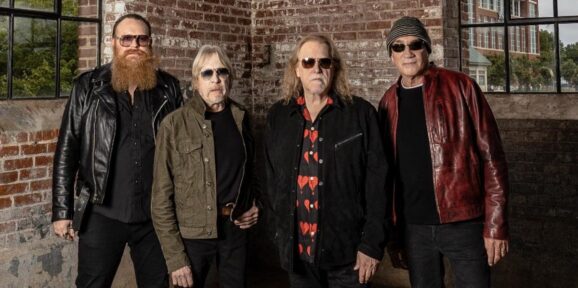Experimental dream pop group Jupiter Sprites – driven by songwriters Max Keena and Alicia Capp – hail from misty Olympia, WA, where late night recording sessions make for a lush array of compositions produced by Keena’s artful ear in his home studio.
In the wake of a series of traumatic events involving two hospitalizations and a car crash, Jupiter Sprites teetered on the brink of disbandment. But in a turn of events, the group took solace in the creative process. What resulted was a fresh musical perspective for the band, ultimately undergoing a sonic metamorphosis.
On their first full length release, Jupiter Sprites offers a delicate balance between poppy bliss and subtle poignancy. Spanning 7 concise tracks, Holographic (due out October 16th) is, in fact, just that—a deep and iridescent projection of the band’s therapeutic experimentations.
Highlights include cascading, effects-laden vocal performances by Capp and Keena, guitar/synth wizardry, mellowed improvisational samples of drummer Mike Elliott, and deep, grounding bass riffs performed by sibling Portia Capp.
Today Glide is excited to premiere “Ocean of You,” a standout track on the new album. Backed by a soundtrack that feels like dream pop meets shoegaze meets Radiohead, Alicia Capp lets her soft, otherworldly vocals drift over the music in a way that is both calming and hypnotic. The band isn’t afraid to take risks, abruptly changing the tempo with a jagged guitar line and sonically dense synths. Capp seems to match her vocal cadence with the natural flow of the music, making for a sensory listening experience.
Listen to the track and read our interview with the duo below…
You’ve said that this album came after an intense period of your life. Can you talk about some of the events that happened and how they inspired or fueled the creative process for this album?
Alicia: Well…personally I have a lot of trauma and I’ve struggled with mental illness since I was young. Mostly anxiety and panic. Last year the band went through a strange and violent altercation with someone during a practice session, and it sort of triggered a whole mess of things. Gear was destroyed, general safety was definitely in question. The whole thing triggered something deep that sent me into a month-long panic attack. I didn’t really sleep or eat for days on end, and I ended up in a psychiatric unit. About a week later, Portia (our bassist and my sibling) broke down in a similar way and also ended up needing psychiatric care. We’re very close, and a lot of our shared trauma comes from our father. At that time it was looking like the band was not going to survive.
As cliche as this may sound….there was a piano in my psych unit. I sort of began to reconnect to the therapeutic aspects of music through that piano, in a really raw way. It got me through my time in there, and I had a renewed perspective on the purpose of music after that. Before, it was for fun…and suddenly it was for survival.
Olympia, WA seems to have a fairly eclectic and large music scene. Obviously people know it for certain bands and music, but what is the scene like these days?
Max: The scene is normally very vibrant and diverse – there are many types of artists spanning from folk to electronic to hip hop, and everything in between. Everyone is very supportive of house shows and local artists. I think there certainly are still traces of the Riot Grrrl movement and the punk thing, but the landscape has changed over the years. I’ve lived here about 10 years, and the beautiful thing is how much it changes every year because of it being a college town. Unfortunately, Covid has completely stopped all activity, but hopefully that’s just temporary.
Was your approach for these songs different than music you had made before?
Max: For this album we really wanted to step it up in terms of the production quality. Everything was done at home, and we didn’t necessarily want the music to sound that way…Our previous recordings sounded kind of lo-fi and to be honest I didn’t totally know what I was doing. We saved up and bought some new gear, but mainly I did a deep dive into critical listening of my favorite artists. We also had it mastered by a wonderful engineer named Greg Calbi and that was definitely a game changer. We couldn’t have been happier with the result!
What is the creative chemistry like between the two of you and how does it work out when you are working on an album in terms of songwriting and crafting the actual music?
Alicia: The creative chemistry is very electric when we feel like something is working, or like we’re onto something. Sometimes this comes from bad ideas that need tweaking, and often-times it’s out of pure experimentation. The outro in “Feeeel” for example—that was a moment of experimentation with reversing things (which we do a lot), and we both totally lit up. We were like “this is perfect!” Often in those moments it’s as if we’ve just locked in on what the track itself wanted to do. Almost like channeling something? Other times it’s a very monotonous process of adding and subtracting layers and ideas. I’m sort of the critical co-producer to Max’s playful, boundless tendencies in production. He is the engineer, I am the arranger.
You seem to draw from a lot of musical influences on this album. Can you share some of the artists and albums that inspired you going into this album?
Max: In terms of production, my all-time favorite producer is Nigel Goodrich (of Radiohead). We are totally obsessed with MBV too, and the dynamics that are going on with having both female and male vocals. Another huge influence is Boards of Canada. Alicia is crazy about Bonobo, too.









